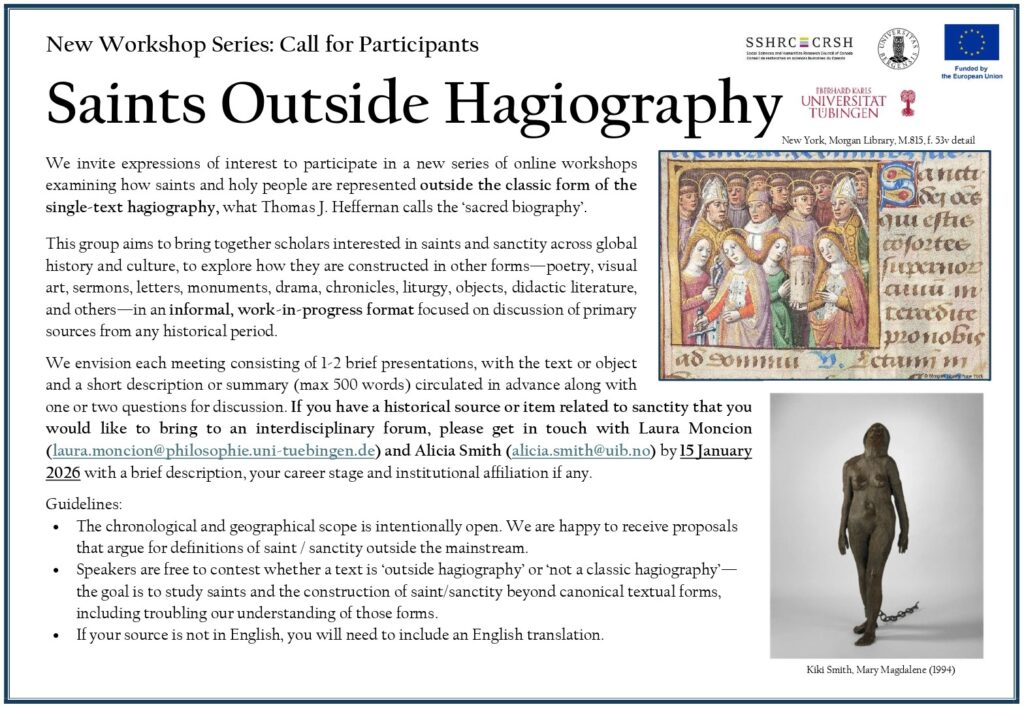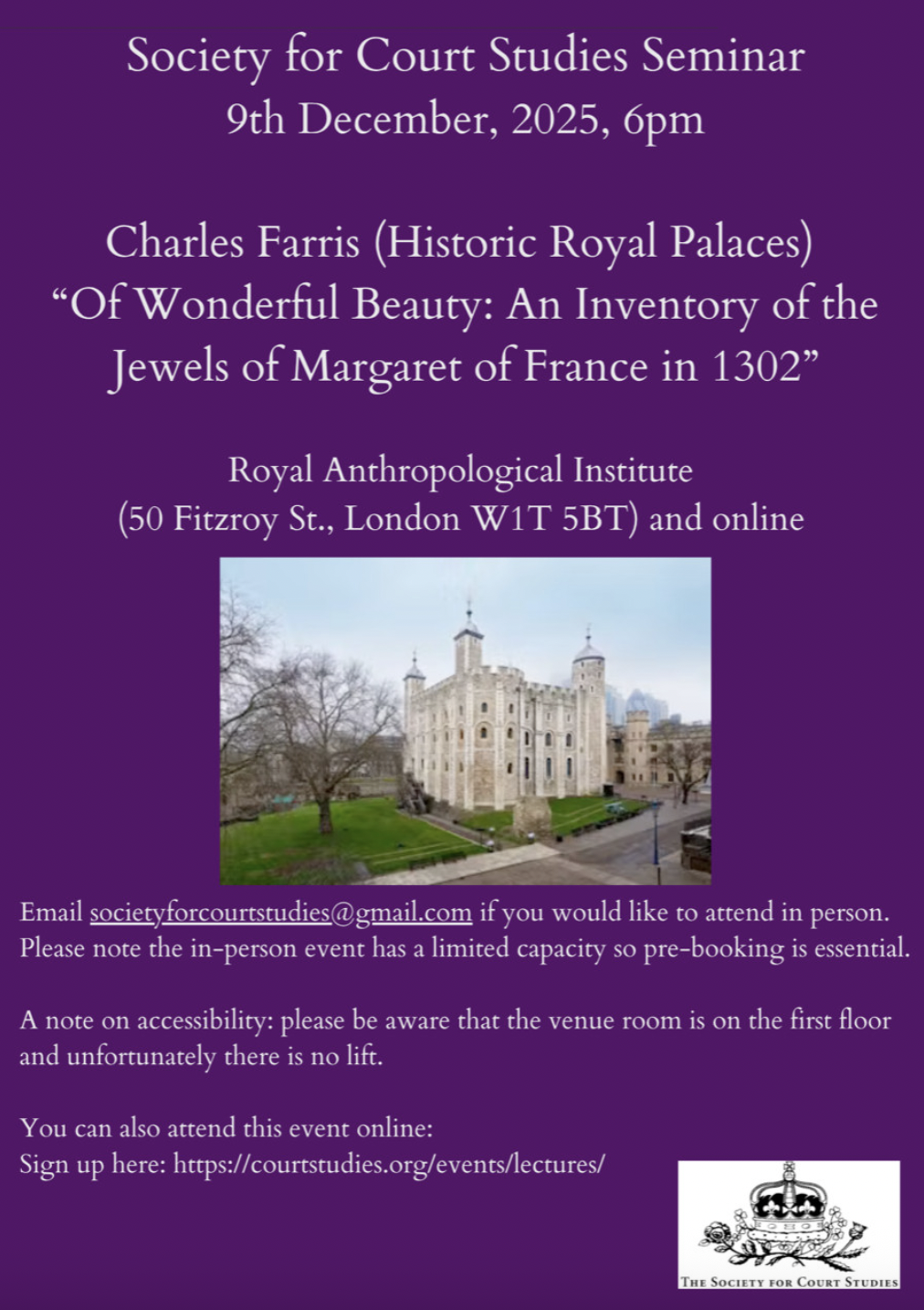Welcome to Week 5.
Apart from the Medieval Studies Lecture this Thursday, I would like to highlight a new CfP: Forgotten Libraries: Lost, Dispersed, and Marginalised Manuscript Collections: The Centre for Manuscript and Text Cultures (CMTC) is pleased to invite Oxford-based researchers to participate in the workshop Forgotten Libraries to be held at The Queen’s College (Oxford) on Tuesday 16 June.
Events
Monday
- French Palaeography Manuscript Reading Group – 10:30, Weston Library
- Medieval History Seminar – 5:00, All Souls College. Jay Rubenstein (University of Southern California) will be speaking on “Queen Melisende of Jerusalem and the Wages of Sin”.
Tuesday
- Europe in the Later Middle Ages Seminar – 2:00, New Seminar Room, St John’s College. Maria Fusaro (Exeter) will be speaking on ‘Maritime Risk Management and Aequitas: the long life of the principle of General Average’
- Latin Palaeography Manuscript Reading Group – 2:00, Weston Library (Horton Room). Those who are interested can contact the convenor, Laure Miolo.
- Maghrib History Seminar- 5:00, The Queen’s College. Prof. Cyrille Aillet (Université Lumière Lyon 2) will be speaking on “Ibadism and Medieval Maghrib: a View from Within”
- Medieval Church and Culture, theme: TRANSLATION(S) – tea and coffee from 5:00, Harris Manchester College. Luisa Ostacchini (Jesus) will be speaking on ‘(Re)working Miracles: translating Gregory the Great’s Dialogues in Old English literature’.
- Medieval French Research Seminar – 5:15, Maison Française d’Oxford. Fran Charmaille (Gonville & Caius College, Cambridge) & Gareth Evans (St John’s College, Oxford) will be speaking on ‘Trans Studies and Medieval Literatures’. (joint seminar with Medieval English)
- Old English Hagiography Reading Group – 5:15, Jesus College Memorial Room. The first text is the anonymous Life of Saint Giles – email Luisa Ostacchini for a copy.
- Church Historian Pub Night – 6:00 at the Chequers Inn. Contact Rachel Cresswell
Wednesday
- Medieval German Graduate Seminar – 11:15, Old Library, St Edmund Hall. The topic for this term is the ‘Liederbuch der Clara Hätzlerin’.
- History and Materiality of the Book Seminar series – 2:15, Weston Library. Andrew Honey will be discussing Bindings.
- Older Scots Reading Group – 2:30, Room 30.401 (Humanities Centre). Palyce of Honour, Seconde Part, ll. 772-1287 .
- The Medieval Latin Documentary Palaeography Reading Group – 4:00, online.
- Late Antique and Byzantine Seminar – 5:00, Ioannou Centre for Classical and Byzantine Studies. Arietta Papaconstantinou (Aix-Marseille) will be speaking on ‘Dependent Labour in the Late Antique Near East’
- Maison Française d’Oxford lecture series – 5:00, at the Maison. Antoine Destemberg will be speaking on ‘‘Is medieval biblical exegesis a form of totemism? An examination of analogical-social thinking in Moralised Bibles’
- Islamic Studies Seminar- 5:30, Oxford Centre for Islamic Studies. Dr Tugba Bozcaga (Kings College London) will be speaking on ‘Imams and Patrons: Service Provision by Islamic Non-State Actors’.
Thursday
- Middle English Reading Group (MERG) – 11:00, Lincoln College, Beckington Room. All are welcome as we read Sir Gawain and the Green Knight: bring any edition of the original text.
- Environmental History Working Group – 12:30–2:00pm, Humanities Centre History Hub Room 20.421. Louis James Henry (PhD Medieval Environmental History, University of Stavanger, Visiting Student at KCL) will be speaking on “Timely Courts and Immediate Responses: Waste Management as a Temporal Issue in Late Medieval England”.
- Pop-up display – ‘What do Christ Church’s newly acquired Hebrew books tell us about the College in the 17th century?’ – 12:00 – 2:00, Christ Church Upper Library. More info here.
- OMS Lecture -5–6.30pm in the Old Dining Hall of St Edmund Hall. Prof. Ian Forrest (Glasgow) will be speaking on ‘Telling Tails: Weaponizing Gender in the Late Medieval Church‘. Drinks to follow. More information and register for dinner.
- Heraldry Society – 5:00, Oriel College. Dr Nicolas Vernot (Guest Researcher, CY Cergy Paris University) will be speaking on ‘Heraldry and Magic’.
- Celtic Seminar – 5:15, Room 20.306 (Humanities Centre and Online). Sarah Zeiser (Harvard) will be speaking on ‘Finding allegory, history, and a complicated timeline in the harvest quatrain of Rhygyfarch ap Sulien’.
- Old English Graduate Reading Group – 5:15. Email Harriet Carter for location.
- Centre for Manuscript and Text Cultures – 5:15, Memorial Room, The Queen’s College. Hana Navratilova (Harris Manchester College/ AMES, Oxford) will be speaking on ‘Meidum: landscape, pyramid, graffiti, and political memory’
- The Khalili Research Centre For the Art and Material Culture of the Middle East: Research Seminar – 5:15, The Khalili Research Centre. Umberto Bongianino (Khalili Research Centre) will be speaking on ‘Wall painting in the Islamic West and the aesthetic of naqsh’.
- Latin Compline in the Crypt with the St Edmund Consort – 9:30, St Edmund Hall.
Friday
- Medievalist Coffee Morning – Friday 10:30, Visiting Scholars Centre (Weston Library). All welcome, coffee and insight into special collections provided.
- The History of the Bible: From Manuscripts to Print – 12:00, Visiting Scholars Centre at the Weston Library. The theme this week is ‘The Bible in Latin: Old Latin and the Vulgate’. Places are limited. To register interest and secure a place, please contact the lecturer at Péter Tóth.
- Pop-up display – ‘What do Christ Church’s newly acquired Hebrew books tell us about the College in the 17th century?’ – 12:00 – 2:00, Christ Church Upper Library. More info here.
- Exploring Medieval Oxford through Surviving Archives – 2:00, Weston Library (Horton Room). Those who are interested can contact the convenor, Laure Miolo.
- Oxford Medieval Manuscript Group – 3:30, Weston Library. Workshop with Laure Miolo: Observing and Measuring the Heavens: Manuscripts, Instruments, and Astronomical Practice in the Middle Ages. Limited places. The deadline to register has passed. Write to Oxford Medieval Manuscript group if you want to go on a waiting list.
- Postponed: the Wikipedia Editathon planned for today has been postponed to Trinity Term.
Opportunities and Reminders
- The deadline for OMS Small Grants for Hilary Term has now closed. Next deadline is Friday week 4 of Trinity Term.
- Are you interested in submitting to the journal Manuscript and Text Cultures? Please review the About the Journal page for the journal’s section policies.
- Doctoral studentship on Carolingian Latin poetry (Toronto-Melbourne).
- ‘Describing the British Library’s Illustrated and Illuminated Incunabula’ PhD placement opportunity at the British Library. Deadline: 27th Feb.
- Donald J. Keefe, S.J. Summer Research Fellowship. Deadline 1st March
- CfP: 20th Annual MEMSA Conference: Connection, Conversation, Contention: Encounters in the Medieval and Early Modern World – deadline 9 March 2026
- CfP: Forgotten Libraries: Lost, Dispersed, and Marginalised Manuscript Collections – deadline 14 March 2026
- CfP: Gender and Medieval Studies conference 2026: Gender and Creativity. The conference will take place at University College, Oxford, 8-10 September. Deadline 13 April.
- CfP: Summer Conference of the Ecclesiastical History Society on the theme “The Church and Race. Deadline 15 April.
- Call for submissions for a special issue of Public Humanities journal on the topic ‘Creating the Medieval Now.’ Edited by Laura Varnam and Eleanor Barraclough. Short essays of 2,000-3,000 words, due 1 May 2026, by medievalists who are also creative practitioners.
- CfP: The Body in History. Deadline 6th July.








